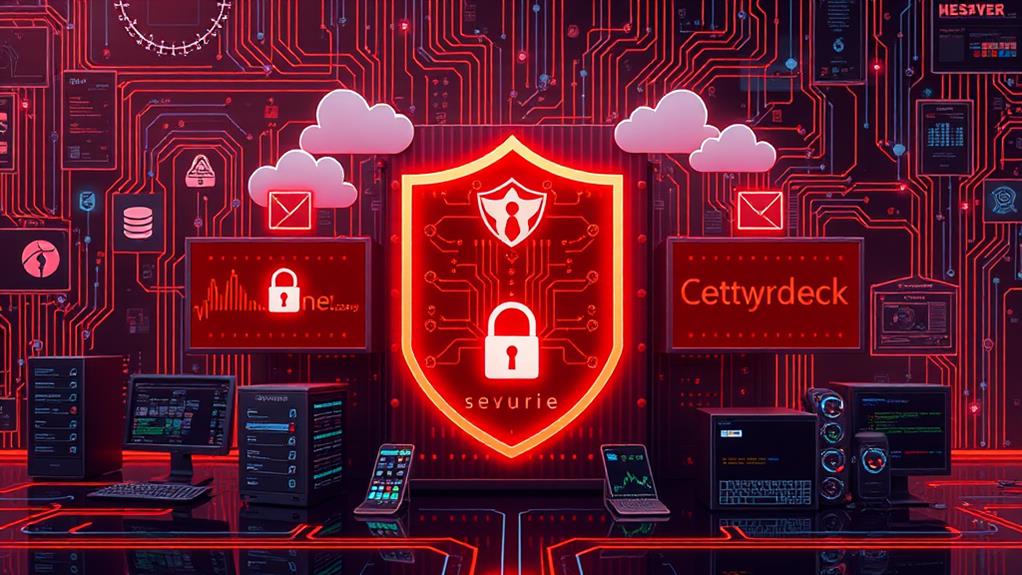When securing a domain name for the long term, it's important to navigate the complex domain registrar environment with precision. From selecting a registrar with a stellar reputation to grasping the nuances of domain extensions and renewal policies, each step requires careful consideration. However, the real challenge lies in safeguarding your domain against unforeseen issues and ensuring its ongoing ownership. Let's examine the key strategies that can help you solidify your online presence with a domain name that stands the test of time.
Key Takeaways
- Consider purchasing domain name outright.
- Ensure domain registration for extended periods.
- Opt for multi-year renewals for permanence.
- Select auto-renewal to avoid expiration.
- Review registrar's policies on permanent ownership.
Choosing the Right Domain Registrar
Selecting the appropriate domain registrar is a critical decision in the process of purchasing a domain name permanently. When choosing a registrar, it is important to conduct thorough research by reading registrar reviews to gauge the reputation and reliability of the service provider. Registrar reviews offer insightful perspectives into the level of customer service, ease of use, and overall satisfaction experienced by users.
In addition to reviewing registrar feedback, conducting a price comparison is essential to make sure you are getting the best value for your investment. Prices can vary significantly between different registrars, so comparing the registration fees, renewal costs, and any additional services included in the package can help you make an informed decision.
Checking Domain Availability
Before purchasing a domain name permanently, it is necessary to check its availability through domain availability tools provided by various domain registrars. These tools allow users to search for specific domain names and see if they are already taken or still available.
Researching different domain registrars is also important to find the best prices and services for securing a domain name long-term.
Domain Availability Tools
When searching for a domain name for your website, one of the important initial steps is to check its availability. Utilizing domain availability tools can streamline this process and help you secure the perfect domain. Here are three essential tools to aid you in checking domain availability:
- Domain Name Generators: These tools can suggest unique domain name ideas based on keywords and other preferences you provide. They help in brainstorming creative and accessible domain names for your website.
- Domain Auction Sites: If you are looking for a domain that is already registered but might be available for purchase, domain auction sites can be a beneficial resource. These platforms host auctions for registered domain names, allowing you to bid on and potentially acquire a domain that suits your needs.
- WHOIS Lookup Tools: WHOIS lookup tools provide information about the current ownership of a domain. By using these tools, you can determine if a domain is available for registration or if it is already taken.
Research Domain Registrars
In the process of establishing an online presence through a website, one important step is researching domain registrars to help with the checking of domain availability. When researching domain registrars, it is essential to explore registrar reviews to gauge their reputation and reliability in the industry. Reading feedback from other users can provide insightful perspectives into the registrar's customer service, user-friendliness, and overall satisfaction.
Another key aspect to examine when researching domain registrars is domain pricing. Different registrars may offer varying pricing structures for domain registration, renewal, and additional services. Contrasting the pricing of different registrars can assist you in finding a registrar that fits within your budget and provides competitive rates for domain services.
Selecting a Domain Extension
When selecting a domain extension for your website, it's important to take into account popular options like .com, .org, and .net, which are widely acknowledged and trusted by users.
Additionally, country-specific extensions such as .uk, .ca, or .jp can help localize your website and target specific audiences.
Specialty domain extensions like .photography, .tech, or .blog can also help convey the purpose or niche of your website.
Popular Domain Extensions
Selecting the appropriate domain extension is a crucial decision when purchasing a domain name permanently. Your choice of extension can impact the brand image, search engine optimization, and user perception. Here are some popular domain extensions to keep in mind:
- .com: The most widely acknowledged and trusted extension, ideal for global reach and credibility. It is the go-to choice for businesses aiming for broad appeal.
- .org: Typically linked with nonprofit organizations, charities, and open-source projects. It can convey a sense of trustworthiness and credibility.
- .net: Initially designated for network-related websites, it is now utilized by a variety of businesses. It can be a good alternative if your preferred .com domain is already taken.
When assessing domain pricing trends and branding strategies, it's crucial to select an extension that aligns with your brand identity and target audience. Remember, the right domain extension can have a significant impact on your online presence and overall success.
Country-Specific Extensions
Exploring domain extensions tailored to specific countries is a strategic move for businesses seeking to establish a localized online presence. Country-specific extensions can play a crucial role in enhancing brand identity and connecting with target audiences on a more personal level.
When considering international expansion, utilizing domain extensions that align with the countries where a business operates can help build trust and credibility among local consumers.
It is important to note that some country-specific extensions may have domain restrictions, requiring individuals or businesses to have a physical presence or legal entity within that country to register such domains. This aspect needs to be carefully reviewed when selecting a country-specific extension for your website.
Moreover, leveraging country-specific extensions allows for domain customization that resonates with local audiences, showcasing a commitment to serving customers in specific regions. By strategically incorporating these extensions into your domain name, businesses can strengthen their online presence and encourage stronger connections with customers worldwide.
Specialty Domain Extensions
To further enhance your domain name strategy beyond country-specific extensions, exploring unique domain extensions can offer a distinct advantage in establishing a one-of-a-kind online presence. Unique domain extensions cater to specific niches and provide a way to stand out in a competitive digital environment.
When selecting a unique domain extension, keep in mind rare extensions that connect with your brand or business. Here are three key points to ponder when delving into unique domain extensions:
- Target Audience: Choose a unique domain extension that directly appeals to your specialized market. For instance, if your website focuses on environmentally friendly products, a .eco extension could be an ideal choice.
- Brand Identity: Align the unique domain extension with your brand identity to reinforce brand recognition. A innovative and relevant extension can help strengthen your brand in the minds of your audience.
- SEO Benefits: Some unique domain extensions can offer SEO advantages by indicating the nature of your website to search engines, potentially enhancing your online visibility.
Registering Your Domain Name
Securing ownership of a domain name begins with the important step of registering it. When registering a domain name, it is vital to take into account the domain transfer process and the associated domain registration fees.
The domain transfer process involves moving your domain name from one registrar to another. It is important to choose a reputable registrar with transparent transfer policies to make sure a smooth process.
Domain registration fees can vary depending on the registrar and the extension of the domain. It is advisable to compare prices and services offered by different registrars before making a decision.
Some registrars may offer additional services or features bundled with the registration fee, so it's important to understand what is included in the cost.
Opting for Domain Privacy Protection
When establishing an online presence through a domain name, one important factor to take into account is the level of privacy protection associated with your registration details. Opting for domain privacy protection offers several benefits:
- Anonymity: Domain privacy shields your personal information from being publicly displayed in the WHOIS database, reducing the risk of spam, identity theft, and unsolicited marketing.
- Security: By masking your contact details, domain privacy helps prevent potential cyber threats and unauthorized access to your sensitive information, enhancing overall security.
- Privacy Compliance: In some regions, privacy protection is a legal requirement to guarantee compliance with data protection regulations and maintain confidentiality.
While domain privacy brings significant advantages, it is important to assess the associated costs. Privacy protection typically incurs an additional fee on top of the domain registration cost.
Grasping the balance between the benefits of privacy and the extra expenses involved is essential in making an informed decision when purchasing a domain name permanently.
Setting Up Auto-Renewal
Considering the various aspects involved in domain ownership, another fundamental element to address is the setup of auto-renewal for your domain name. Auto-renewal guarantees that your domain name remains registered to you without the risk of expiration. By enabling auto-renewal, you can avoid potential website downtime, loss of email services, and the risk of losing your domain name to someone else.
To ensure a smooth auto-renewal process, it is vital to keep your payment methods updated. This will ensure that the renewal fees can be processed without any issues.
Additionally, setting up renewal reminders can help you stay informed about upcoming payments and maintain that your domain name remains active. By utilizing these features, you can maintain continuous ownership of your domain name hassle-free.
Transferring Domains to Another Registrar
The process of transferring domains to another registrar involves moving the registration of your domain name from your current domain registrar to a different registrar of your choice. This process allows you to manage your domain under a new service provider while retaining ownership and control. Here are some key steps to take into account when transferring domains:
- Initiate the Transfer: Begin by releasing your domain with your current registrar and obtaining an authorization code. Then, submit a transfer request with your new registrar.
- Confirm Ownership: During the transfer process, you may be required to validate your ownership through email confirmation or by providing additional documentation.
- Complete the Transfer: Once the transfer request is approved, your domain registration will be moved to the new registrar. Verify that all settings and DNS configurations are correctly updated to avoid any disruptions to your website or email services.
Transferring ownership of your domain to a new registrar can offer you more flexibility and control over your online presence.
Understanding Domain Renewal Policies
With the expiration of a domain name registration comes the requirement to grasp the complexities of domain renewal policies. Domain expiration refers to the end of the registration period for a domain name, after which it must be renewed to prevent it from being released back into the pool of available domains. Understanding domain renewal policies is vital to guarantee the uninterrupted ownership of your domain.
Renewal fees are the expenses associated with extending the registration period of a domain name beyond its initial term. These fees vary between domain registrars and are typically charged annually. It is important to be conscious of the renewal fees and their payment deadlines to avoid any disruptions in your online presence.
Some registrars may offer discounts for multi-year renewals, providing an opportunity to save on costs in the long run. By acquainting yourself with domain renewal policies and staying proactive in renewing your domain on time, you can maintain control over your online identity.
Securing Your Domain With SSL Certificate
To protect your domain and enhance security measures, obtaining an SSL certificate is crucial. SSL benefits include encryption of data transmitted between a user's browser and your website, guaranteeing confidentiality and integrity.
Additionally, SSL certificates help build trust with visitors by showing a padlock icon and "https://" in the URL, signifying a secure connection. Here are key steps for SSL installation:
- Select the appropriate SSL certificate type based on your website's requirements, such as domain validation, organization validation, or extended validation.
- Purchase an SSL certificate from a reputable Certificate Authority (CA) to ensure genuineness and compatibility with most browsers.
- Set up the SSL certificate on your web server following the CA's specific guidelines, which may entail creating a Certificate Signing Request (CSR) and configuring your server settings.
Frequently Asked Questions
Can I Change My Domain Name After Purchasing It Permanently?
Changing domains after purchasing permanently is possible but requires strategic rebranding tactics. It involves updating website content, redirecting traffic, and ensuring SEO continuity. Careful planning is essential to minimize disruption and maintain online presence.
Consider the impact on branding, marketing efforts, and customer recognition. Seek professional guidance to navigate the technical aspects smoothly. Embrace the opportunity to refresh your online identity while ensuring a seamless shift for your audience.
What Happens if I Forget to Renew My Domain Name?
If one forgets to renew their domain name, it could lead to disruptions in website functionality, loss of email services, and potential loss of significant online presence. Renewal reminders are essential to avoid such outcomes. Opting for automatic renewal options or setting up safeguards can help prevent unintentional lapses.
It is important to stay proactive in managing domain registrations to guarantee smooth online operations and uphold a strong digital presence.
Are There Penalties for Transferring My Domain to Another Registrar?
When considering changing domain registrars, it's important to be aware of potential transferring penalties. Most registrars do not charge penalties for transferring a domain to another registrar. However, it's advisable to verify this information with your current registrar prior to initiating the transfer.
Additionally, some registrars may have specific policies or fees associated with transferring domains, so it's recommended to review these terms carefully to avoid any unexpected costs or complications during the process.
Can I Buy a Domain Name Permanently for Someone Else?
When purchasing a domain name for someone else with the intention of gifting ownership, it's important to understand the legal ramifications involved. Domain ownership is usually transferable, allowing for a smooth handover of rights. However, it is vital to follow correct procedures to guarantee the transfer is valid and enforceable. Seeking advice from a legal expert or domain registrar can offer guidance on best practices to ensure a smooth gift of domain ownership.
How Can I Protect My Domain From Being Stolen or Hijacked?
In the digital world, safeguarding your domain from theft or hijacking is of utmost importance. Employing robust security measures such as two-factor authentication, regular domain monitoring, and timely renewal can help prevent unauthorized access.
Additionally, opting for privacy protection services to shield personal information from potential threats is advisable. Maintaining vigilance and promptly addressing any suspicious activity are key steps in upholding the security of your domain and ensuring its integrity.
Conclusion
In conclusion, obtaining a domain name permanently involves selecting a trustworthy registrar, verifying availability, choosing the appropriate extension, and opting for auto-renewal and privacy protection. By grasping renewal policies and exploring extra security measures like SSL certificates, you can guarantee the long-term ownership and safeguarding of your domain. Just like planting a tree, nurturing your domain will allow it to thrive and prosper in the extensive digital environment.








